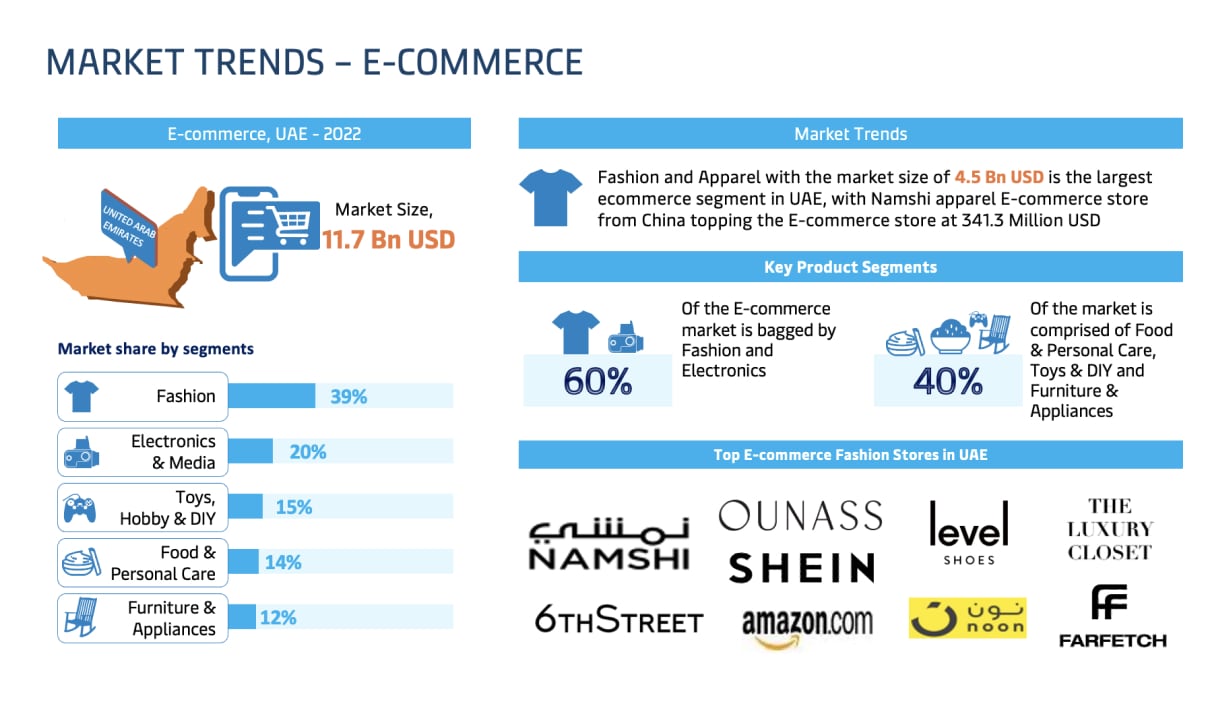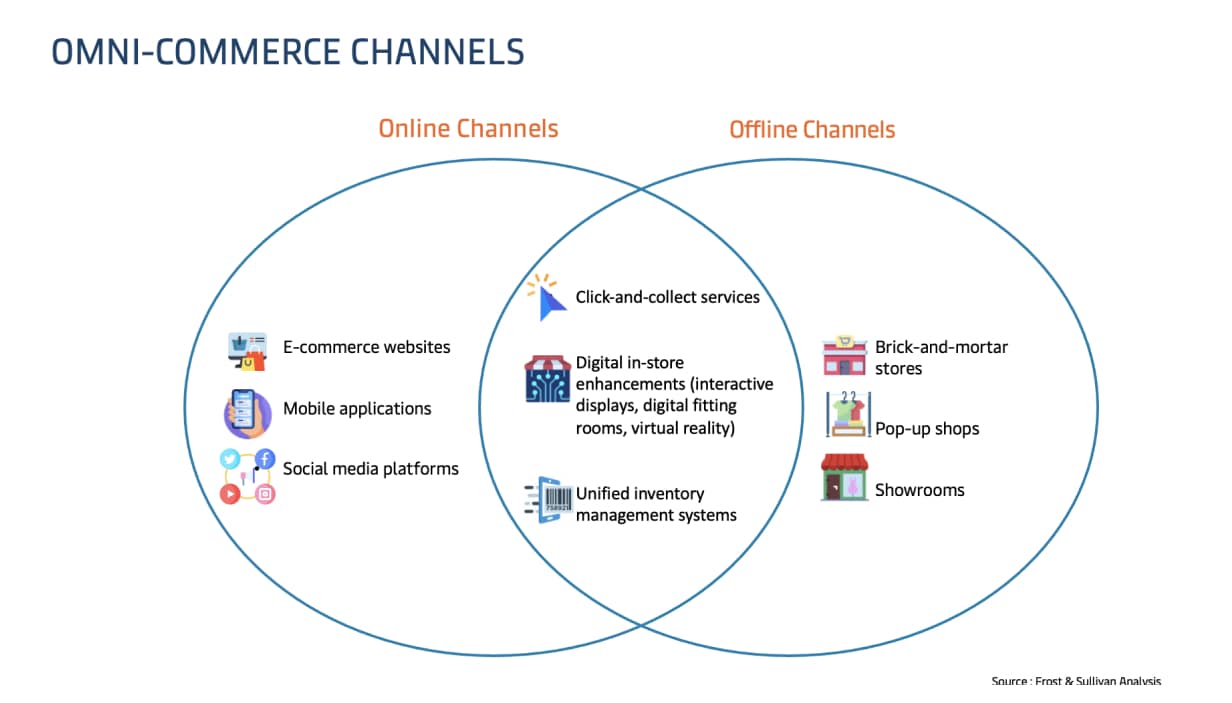The United Arab Emirates (UAE) is a rapidly expanding fashion retail market fuelled by a strong economy, high per capita income, and youthful, fashion-conscious population. UAE recorded a 13% increase in consumer spending in 2022 across the retail economy, including fashion. UAE’s online fashion retail market was worth $4.5 billion dollars at the end of 2022 and is estimated to grow at a compound annual growth rate (CAGR) of 9% between 2023 and 2027, reaching a value of $6.4 billion dollars by 2027.
Several factors, including increasing internet penetration, rising smartphone utilization, shifting consumer preferences, and the influence of social media, have contributed to this expansion. The UAE's Internet penetration has increased dramatically over the past decade, reaching 99% in 2022. This high level of connectivity has provided consumers with convenient access to online shopping platforms, allowing them to investigate a vast array of fashion products and make informed purchasing decisions.
Online platforms have become an attractive alternative to traditional brick-and-mortar stores due to their convenience, expansive product selection, and competitive pricing. The rapid growth in the use of smartphones, with 96% of the population in the UAE owning a smartphone, has led to mobile commerce becoming a key driver of online retail growth. Fashion retailers are investing in mobile-optimized websites and applications to accommodate the increasing number of consumers who shop via smartphones.
Young, fashion-conscious residents of the UAE have contributed to a shift in consumer preferences towards online purchasing. Social media platforms, such as Instagram and Facebook, have significantly influenced the fashion retail landscape in the UAE. They have provided a platform for fashion influencers and bloggers to display the newest trends and products, thereby influencing consumer purchasing decisions and driving traffic to online retail platforms.
E-commerce revenue in the UAE is predicted to reach $12 billion by the end of 2023 and is projected to reach $17.2 billion in 2027, demonstrating the strong upward trajectory of online E-commence growth.

What’s the role of Omni-commerce?
Omni-commerce can be defined as the seamless integration of online and offline retail channels that offers a consistent and personalized purchasing experience across all touchpoints. It is quite often confused with omni-channel, but there is a small subtle difference between the concepts of omnichannel and omni-commerce.
Omni-commerce strategies also emphasize the significance of a consistent customer service experience across all channels. By providing consistent and responsive support, whether via chatbots, social media, or in-store employees, fashion retailers can increase consumer satisfaction and establish long-lasting relationships.
How is it perceived by UAE Fashion retailers?
In the context of the United Arab Emirates, omni-commerce refers to the use of multiple channels, such as brick-and-mortar stores, e-commerce websites, mobile applications, and social media platforms, to engage customers and satisfy their requirements. Fashion retailers in the UAE have adopted omni-commerce strategies to stay competitive in the current market scenario.
In line with the trends observed, click-and-collect services have started growing in prominence in the UAE because they offer customers the convenience of purchasing goods online and picking them up at a physical store location. This service not only reduces delivery times but also affords retailers the opportunity to increase in-store sales through impulse buys and upselling. Numerous fashion retailers in the UAE have invested in the incorporation of digital elements, such as interactive displays, digital fitting rooms, and virtual reality (VR) technology, to enhance the in-store experience.

Fashion retailers are progressively employing data-driven marketing strategies to personalize their customers' shopping experiences. By analyzing customer data from multiple sources, such as purchase history, browsing behavior, and social media activity, retailers can create customer-specific, targeted marketing campaigns.
These innovations bridge the gap between online and offline shopping, providing consumers with a more immersive and captivating experience. Implementation of unified inventory management systems is a crucial component of successful omni-commerce strategies. By incorporating inventory data from online and offline channels, retailers can optimize stock levels, reduce the risk of stockouts, and provide real-time product availability information to customers.
How are they harnessing emerging technologies for a competitive advantage?
Navigating the country's cultural sensitivities is one of the difficulties encountered by fashion retailers operating in the UAE. Retailers must establish a balance between providing a diverse selection of products and adhering to local customs and cultural standards. As retailers acquire and analyse customer data, the maintenance of customer trust and the protection of customer data becomes crucial concerns. To protect consumer information and preserve their reputation, retailers must invest in robust cybersecurity measures and comply with data privacy laws.
For UAE fashion retailers, emerging technologies such as artificial intelligence (AI), augmented reality (AR), and the Internet of Things (IoT) present significant opportunities. By incorporating these technologies into their omni-commerce strategies, retailers can improve the consumer experience, streamline operations, and achieve a competitive advantage. The UAE's variegated population and expanding expatriate community offer niche market opportunities to fashion retailers. Retailers can differentiate themselves and capture additional market share by catering to the specific requirements and preferences of these segments.
Adaptation and Innovation: Key Drivers for Success
Consumers in the UAE have high expectations for product quality, customer service, and the overall retail experience. To meet these demands, retailers must focus on innovation and continuous development in every aspect of their operations.
To be successful in the UAE's competitive fashion retail market, retailers must prioritize omni-channel integration and provide a seamless, individualized customer experience. This includes instituting click-and-collect services, enhancing in-store digital experiences, and ensuring consistent customer service across all channels. By investing in data-driven personalization and targeted marketing, fashion retailers can create customer-specific purchasing experiences that resonate with their consumers. Retailers should utilize customer data to create targeted marketing campaigns and personalized product suggestions, thereby nurturing customer loyalty and boosting sales.
To streamline operations and enhance the customer experience, retailers should adopt emerging technologies such as AI, AR, and IoT. These technologies can assist retailers in optimizing inventory management, enhancing the in-store experience, and providing more individualized customer service. Retailers of fashion in the UAE should seek out strategic partnerships and collaborations with local designers, influencers, and other fashion ecosystem stakeholders. These partnerships can help retailers increase brand recognition, credibility, and customer loyalty, as well as boost consumer engagement and revenue.
The online fashion retail market in the UAE is experiencing significant growth due to shifting consumer preferences, increasing internet penetration, and social media's influence. To take advantage of this growth, fashion retailers must embrace omni-commerce strategies that prioritize integration, personalization, and customer engagement. Fashion retailers can flourish in this dynamic market and gain a competitive edge by addressing the challenges and opportunities presented by the UAE's rapidly changing retail landscape.
In conclusion, the UAE's fashion retail market is on a growth trajectory, driven by consumer preferences, technology adoption, and the embrace of omni-commerce strategies. Success in this dynamic market requires agility, innovation, and the ability to provide a seamless, personalized, and engaging customer experience. By staying ahead of the curve and leveraging the opportunities presented, fashion retailers can thrive in the UAE's evolving retail landscape.
未来,您想随时了解必读行业趋势吗?
您已经完成了,欢迎“登船”!
很抱歉,发送您的联系请求时出现问题。
请查看表单字段,确保所有已正确填写所有必填信息。如果问题仍然存在,请联系我们的支持团队以获得进一步的帮助。
未来,您想随时了解必读行业趋势吗?
使用此表格注册,即可直接在您的邮箱中接收我们的洞察见解,进入一个真正的综合物流世界。简单操作,即从我们为您量身定做的精选文章中获得启发,了解相关行业洞察信息。您可以随时取消订阅。













